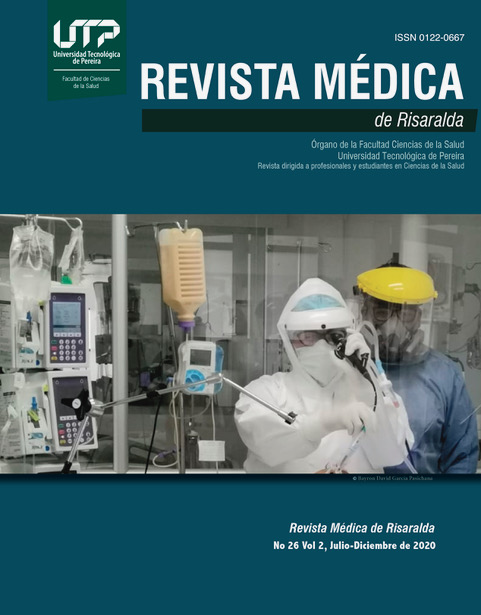Sodium fluoracetate's poisoning: A case report
DOI:
https://doi.org/10.22517/25395203.24444Keywords:
poison, toxicology, sodium fluoroacetate, Blood poisoning, Sodium fluoroacetate, Acute renal failureAbstract
Introduction: Sodium fluoroacetate, known as compound 1080, was discovered in Germany during the Second World War. It is usually used as a rodenticide, it is an odorless and tasteless substance, with a lethal dose in humans of 2 mg / kg that is why it was withdrawn from the market in some countries, including Colombia; however, it is obtained illegally. This substance has biochemical and physiological effects at the cellular level that alter the transport of citrate at the mitochondrial level, generating accumulation of lactic acid and alteration of the glucose use. The clinical manifestations are nonspecific since there is no any cardinal symptom. Therefore, its diagnosis is made due to high clinical suspicion associated with establishment of exposure to the compound in view of the difficulty to obtain paraclinical confirmation in a timely manner.
Methods: We present a case report of intentional ingestion of sodium fluoroacetate in an adolescent that is associated with an infection added to the bloodstream by methicillin- sensitive Staphylococcus aureus (MSSA). The patient developed multiple complications that lead to support in the Intensive Care Unit (ICU) with a satisfactory outcome. In view of the lack of a specific antidote, she was treated with ethanol in order to increase the level of acetate; thus, offering an alternative substrate to the Krebs cycle. It is suggested that the ethanol offers benefits in the acute treatment of these patients.
Results: The patient with sodium fluoroacetate poisoning and kidney failure received renal replacement therapy with a favorable evolution and survival at discharge from the intensive care unit of a third-level hospital in the city of Pereira, Risaralda, Colombia.
Conclusions: Sodium fluoroacetate poisoning is relatively rare and can cause acute kidney injury and multi-organ failure with a high rate of complications and death. A case of self-inflicted poisoning that received a timely manner continuous renal replacement therapy with a favorable outcome in terms of ICU survival was presented.
Downloads
Downloads
-
Vistas(Views): 7817
- PDF (Español (España)) Descargas(Downloads): 1006
Published
How to Cite
Issue
Section
License
Cesión de derechos y tratamiento de datos
La aceptación de un artículo para su publicación en la Revista Médica de Risaralda implica la cesión de los derechos de impresión y reproducción, por cualquier forma y medio, del autor a favor de Facultad de Ciencias de la Salud de la Universidad Tecnológica de Pereira. 1995-2018. Todos los derechos reservados ®
por parte de los autores para obtener el permiso de reproducción de sus contribuciones. La reproducción total o parcial de los trabajos aparecidos en la Revista Médica de Risaralda, debe hacerse citando la procedencia, en caso contrario, se viola los derechos reservados.
Asimismo, se entiende que los conceptos y opiniones expresados en cada trabajo son de la exclusiva responsabilidad del autor, sin responsabilizarse ni solidarizarse, necesariamente, ni la redacción, ni la editorial.
Es responsabilidad de los autores poder proporcionar a los lectores interesados copias de los datos en bruto, manuales de procedimiento, puntuaciones y, en general, material experimental relevante.
Asimismo, la Dirección de la revista garantiza el adecuado tratamiento de los datos de carácter personal



